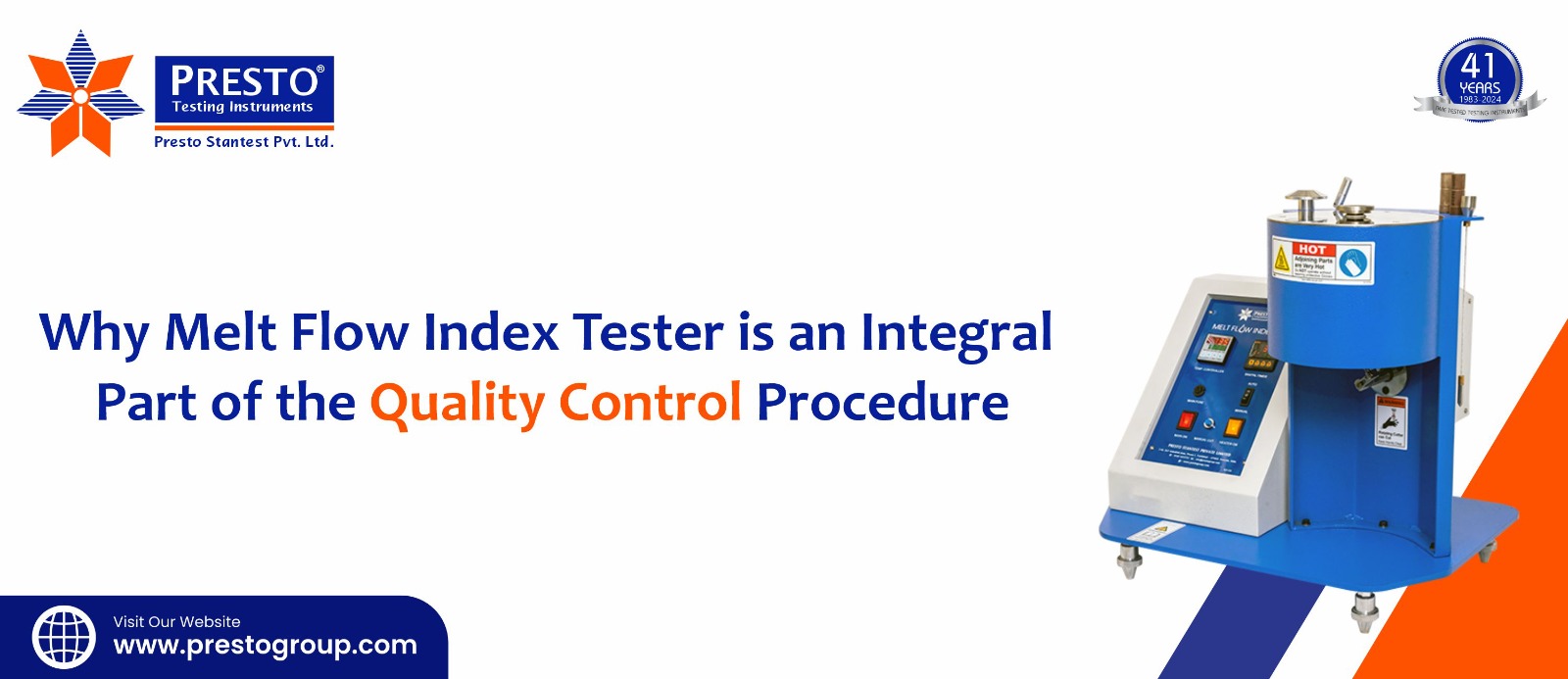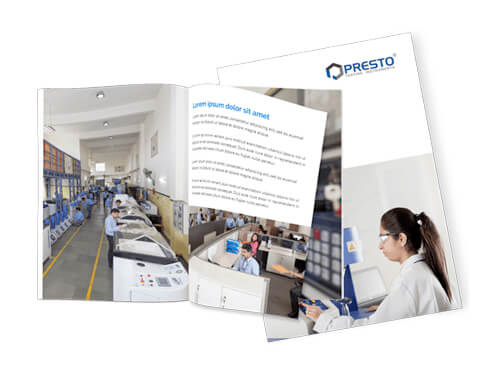Why Melt Flow Index Tester is an Integral Part of the Quality Control Procedure

Gaurav Malhotra
15-11-2024
Behind polymer processing is the silent player that ensures consistent quality in plastics and resins: The Melt Flow Index, or MFI. An MFI tester is an indispensable machine a manufacturer uses to determine the flow rate of molten polymers under controlled conditions. Why is it important? And how it might affect your business in terms of investment in an MFI tester? Let's take a closer look.
Melt Flow Index Testing: Significance
Melt Flow Index (MFI) is one of the most important properties of polymers that indicate material processability and its adaptability to various applications. MFI measures the flowing ease of a polymer when heated, providing, in effect, a numerical value in which manufacturers will find out how the material behaves when it is subjected to extrusion or injection molding.
MFI results directly in the performance and quality of plastic products. A melt flow index tester helps identify how polymers behave, their viscosity, and consistency, and on which the production of quality finished goods depends. If the materials used have erratic flows, then you expose yourself to possible defects in the final product, high rates of rejection, and a higher cost for your productions.
Enter the Melt Flow Index Tester
The melt flow index tester is specialized equipment used to measure the rate at which the material flows when subjected to a defined load, and then heated up to a specific temperature. This will measure the processibility of the material. The tester gives a quantitative measure of how a polymer melts under stress, making it invaluable to manufacturers of polyethylene, polypropylene, and PVC, among others.
Presto is the leader in providing melt flow index testers that allow quality control labs and R&D departments to obtain accurate and reliable results. Global standard melt index machines are engineered for accuracy and durability for your quality control processes.
Why Presto?
Presto is a melt flow index tester manufacturer that has achieved a good reputation for more than 40 years in the business of quality testing equipment and great production. Having much experience with polymer testing and material science, we are able to establish ourselves as the producers of reliable and accurate testing instruments. Many of the world's best manufacturers use our melt flow index testers to make sure that their plastic products meet the best standards.
Our melt flow index testers serve the specific purpose of various tests and are available in different models. All our machines are engineered to have precision control and are robust enough to handle any type of product. It could be a research institution, a polymer manufacturer, or even just a lab that is focused on quality control, but all in all, our equipment at Presto will help you improve your testing capacities through streamlined processes.
The Return on Investment (ROI) of a Melt Flow Index Tester
Melt flow index testing is not all about the right measurements, it is about improving your overall manufacturing process to get an eventual higher return on investment. We broke down ROI a little further, so here it is:.
1. Improved Product Quality
Improved product quality is, arguably, the most self-evident advantage a melt flow index can provide. Precise control over the rate of melt flow can ensure optimum processing conditions for polymer materials with fewer defects, low scrap rates, and much more consistency in the final product.
A Presto-based study on the effect of MFI testing in producing polyethylene has revealed that companies that adopt routine MFI testing reduce product defects by 25%, thus successfully making their product consistent by 20%. Direct savings in production costs and higher customer satisfaction are the straightforward benefits of these reductions in defects.
2. Better Process Productivity
Testing the melt flow index helps manufacturers determine whether the polymer can be used in some specific application and processing method. Manufacturers have less waste and rework because of early identification of the flow characteristics by selecting the right material for the job thus leading to better material utilization and increased overall efficiency.
A major plastic manufacturer reported that the implementation of melt flow index testing had provided a saving of 15% in raw material waste and 10% in cycle times. Savings in operations save money but also help to bring a product to the market sooner.
3. Cost Savings
Companies can avoid costly errors from suboptimal materials because this issue is caught early on in the production stage. When the right polymer is applied for the right application, the chances of quality failures, production stoppages, and post-production rework are less likely to happen. Consequently, there is considerable cost saving involved.
This real-world example of a client installation of Presto's melt index tester proved that the company had cut material costs by 18% per annum through an optimum selection of polymers for each application, thereby reducing wastage and better procurement of raw materials.
4. Accelerated Time-to-Market
In competitive industries, speed does matter. The lead time in getting new products to the marketplace will be reduced if you can quickly assess a polymer's suitability for various applications and streamline production. This would be possible with a melt index tester, where R&D is accelerated and delays are minimized during the production cycle.
Recently, a top injection molding company case study discovered that the development time of new products was reduced by 30% using a melt flow index tester. Because of this, the company entered new markets earlier than expected and had an upper hand over its competitors.
5. Compliance with Regulations
Many industries are even strictly regulated regarding material properties. Ensuring the melts used comply with industry standards is a great task melt flow index testing solves. Whether it is ASTM, ISO, or any other global standard for testing, having a solid melt index machine in your lab ensures that your materials will meet all the needs set in place by those requirements for safety and quality.
How Melt Flow Index Testing Improves Quality Control
The melt flow index tester has one of its most vital applications in quality control. Testing the melt flow rate of incoming raw materials gives manufacturers an assurance that only high-quality polymers are being made use of. This implies fewer problems in processing, and it will assuredly ensure final products meet specifications.
FAQs
What are the uses of the Melt Flow Index?
A melt flow index tester is applied to measure the flow rate of molten polymers; which is highly necessary for specifying their processability and quality in manufacturing.
Why is MFI important in polymer manufacturing?
The importance of MFI lies in helping manufacturers quantify the viscosity and flowability of polymers, which directly affects their ability to be processed and moulded into finished products.
When should MFI testing be done?
MFI testing needs to be undertaken regularly, more so when there are new raw materials or the processing variables will be changed. This will ensure the product
Invest in Your Lab's Future with a Melt Flow Index Tester
Invest in a melt flow index tester if you plan to enhance the quality of your products, boost efficiency in production, and minimize costs. Browse through our range of melt flow index machines offered at Presto, and enjoy accurate and reliable results on any polymer material.
Whether your concern is R&D, quality control, or optimizing your production, Presto melt flow index testers aid you in gaining greater control over your materials, and therefore also achieve higher standards of quality. Our melt flow index testers are characterized by an easy interface, robust construction, and precise measurement capabilities indispensable tools for any laboratory.
Want to know how a melt flow index tester can be a great addition to your manufacturing process? Contact Presto today to explore our models and get a custom solution for your testing needs.
Phone: +91 9210903903
Mail: info@prestogroup.com
you may also like
Recent News
- Paper & Packaging Testing Instruments
- Paint, Plating & Coating Testing Instruments
- Plastic & Polymer Testing Instruments
- Environmental Testing Chambers
- PET & Preform Testing Instruments
- Color Measuring Testing Instruments
- View Entire Range Instruments

Catalogue 2023
Get information about new product launches, research, innovation and endeavors at Presto.
download Free Copy
Get a Quote

